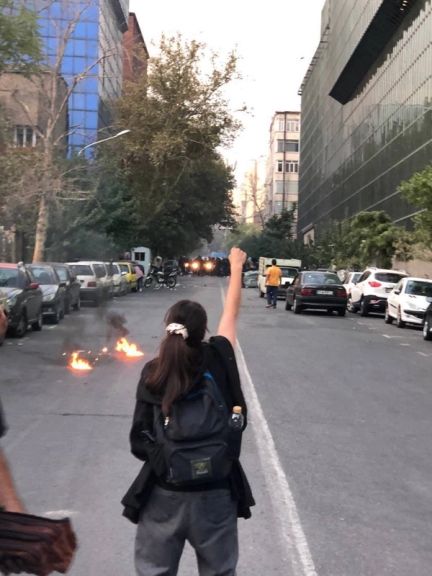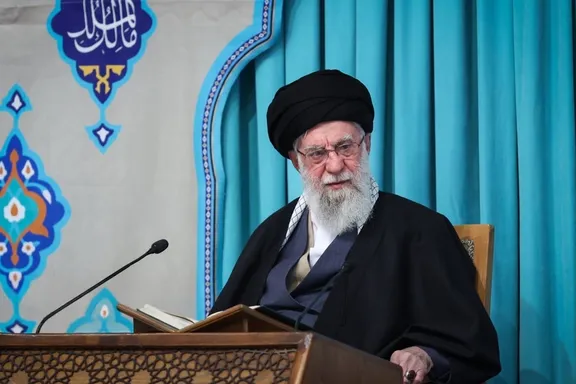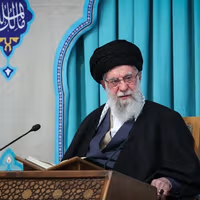Q: Who oversees IRIB’s operations and leadership?
Established after the 1979 Islamic Revolution, IRIB is the sole entity authorized to broadcast radio and television signals in Iran.
Under Iran’s Constitution, IRIB operates under the control of the supreme leader, who holds the authority to appoint and dismiss its head. The supreme leader's influence extends through his appointed representative within the organization.
The IRIB Supervisory Council, formed under Article 175 of the Constitution, includes representatives from the president and Parliament, each selecting two members. The chief justice, appointed by the supreme leader, selects two of the council's six members, further consolidating the supreme leader’s oversight.
Q: What are the sources of IRIB’s budget?
Unlike public service broadcasters in some other countries, such as the BBC, which is primarily funded through license fees and advertising, IRIB receives its budget from the government, supplemented by advertising revenue.
For the Iranian calendar year ending March 20, 2025, Parliament allocated 240 trillion rials (approximately $400 million) to IRIB. Despite an estimated $35 billion budget deficit, IRIB’s funding has consistently increased over the years, often surpassing inflation. This year’s allocation is three times higher than the previous year’s.
In addition to its main budget, IRIB receives separate funding for “cultural” activities and earns substantial revenue from advertising, amounting to trillions of rials annually.
IRIB is a vast organization employing between 30,000 and 50,000 people, significantly more than the BBC, which has around 21,000 employees.
Q: To which political factions are IRIB heads affiliated?
The IRIB is currently led by ultra-hardliners closely linked to the Paydari (Steadfastness) Party and the Revolutionary Guards (IRGC), both of which hold significant influence in Iran’s political system.
In 1987, shortly after becoming supreme leader, Ali Khamenei reinstated Mohammad Hashemi-Rafsanjani as the head of IRIB. Hashemi-Rafsanjani had been appointed by Khamenei’s predecessor, Ruhollah Khomeini, the founder of the Islamic Republic. He is also the brother of Akbar Hashemi-Rafsanjani, a prominent moderate conservative politician who played a key role in ensuring Khamenei succeeded Khomeini as supreme leader.
Hashemi-Rafsanjani’s tenure at IRIB ended in 1993. Since then, Khamenei has exclusively appointed leaders from the Principlist political camp, a coalition of conservative and ultra-hardline groups that dominate Iran’s right-wing politics.
Principlists have traditionally formed alliances against reformist politicians in elections. However, in the past decade, these alliances have narrowed, with many moderate conservatives—such as former President Hassan Rouhani and former Speaker of Parliament Ali Larijani, who headed IRIB from 1994 to 2004—distancing themselves from hardliners and ultra-hardliners.
Q: Who is the current head of IRIB?
Supreme Leader Ali Khamenei appointed Peyman Jebelli, a former head of IRIB’s foreign services, as the organization’s chief in 2021. Jebelli is politically aligned with Saeed Jalili, an ultra-hardline politician and former secretary of the Supreme National Security Council, who ran in the snap presidential elections of July 2021.
Jebelli appointed Vahid Jalili, Saeed Jalili’s brother, as his cultural deputy. In this role, Vahid Jalili wields significant influence over IRIB’s policy direction. He is also a member of the ultra-hardline Paydari (Steadfastness) Party, further consolidating the faction’s control over the state broadcaster.
Q: What foreign-language services does IRIB offer?
Press TV, launched in July 2007, is IRIB’s primary international channel, broadcasting in English.
In addition to Press TV, IRIB operates several channels targeting foreign audiences in multiple languages. These include Arabic-language channels such as Al-Alam, Al-Kawthar TV, and Al-Alam Syria; a Spanish-language channel, Hispan TV; and Hausa TV, which is aimed at West African audiences.
The IRIB also runs the Sahar Universal Network (SUN), launched in 1997, which broadcasts in languages including Dari, Azeri, Kurdish, Urdu, and Balkan languages such as Bosnian and Albanian.
The Jam-e Jam Network, which targeted Iranian expatriates and shared its name with the California-based opposition channel Jaam-e Jam that began broadcasting in 2015, ceased operations in 2023.
Q: Why has IRIB faced international sanctions?
IRIB has been sanctioned by multiple countries and organizations, including the United States and the European Union, for its role in censorship and human rights violations.
These sanctions cite IRIB’s broadcasting of forced confessions and its close ties to Iran’s security apparatus, which have been used to suppress dissent.
The current head of IRIB, Peyman Jebelli, is also under Western sanctions, including those by the US, for facilitating the suppression of free speech and using the media to support state violence.
Press TV, IRIB’s English-language outlet, has been sanctioned by the US and European entities for similar reasons.
Q: What is IRIB’s viewership?
IRIB’s viewership has significantly declined over the past two decades as many Iranians have turned to satellite TV channels, including banned Persian-language news and entertainment channels based abroad, instead of the national broadcaster.
IRIB officials claim that the organization retains a viewership of 72 percent. However, a survey by the Iranian Students Polling Agency (ISPA), a government-affiliated polling body, reported a substantial drop, with only 12.5 percent of respondents identifying IRIB as their primary source of news, down from 51 percent in 2017. The same survey found that just 11.5 percent watch IRIB’s entertainment programs.
In recent years, IRIB’s monopoly has also been challenged by the rise of online entertainment platforms such as Filimo, which are gaining popularity among Iranian audiences.









